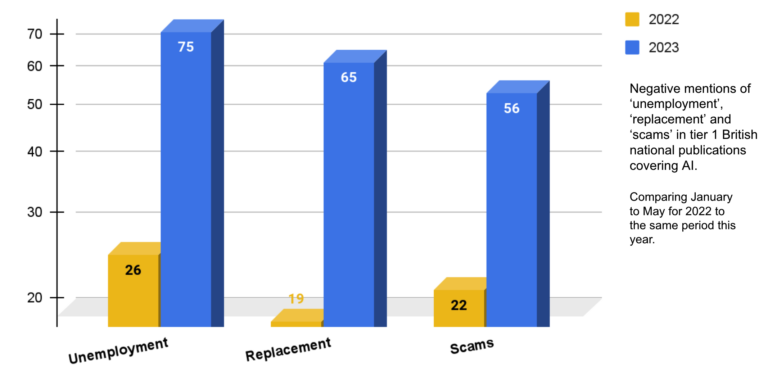Artificial intelligence has become a huge topic in the British media in the first five months of 2023: and most of it is negative. This is a problem, argues Nia Evans, GM at PAN Communications.
This year, we’ve seen alarmist reporting about Artificial Intelligence skyrocket as the full capabilities of generative AI is revealed.
British media stories about AI increased 100% across the period January-May this year, and negative sentiment in those articles was 83%.
Warnings of ‘scams’, ‘unemployment’ and ‘replacement’ are leading the agenda, gaining a foothold in AI coverage three times larger than last year. Recent AI reporting has been dominated by calls for regulation, AI-powered fraud and mass layoffs, not to mention warnings of human extinction!
AI Negativity in UK Media: 2022 vs 2023

Tech Companies Need to Speak Out
Of course, bad news always dominates headlines: the media has always subscribed to the mantra that if it bleeds, it leads. And reporters are right to scrutinise the far-reaching potential of AI and explore potential negative consequences.
But when reporting is so one-sided, it’s worth asking the question of whether tech companies innovating in AI should do more to speak up and introduce a sense of balance to the conversation?
The tech companies driving AI forward, primed for growth, stand to lose out in a big way if they don’t push back and gain a voice in the media. Poor public perception could jeopardise investor interest and opportunities for funding, putting the brakes on AI innovation in the UK.
The Cost of Keeping Quiet
Made up of more than 1,486 AI companies, it is estimated the UK AI market could be worth over £1 trillion by 2035. Better communicating the value of AI and what the sector has to offer is quickly becoming a priority for marketing teams at tech companies innovating in AI tech.
If people are only fed a diet of scare stories, they might also be less inclined to experiment with the many free AI tools available. This is exactly the opposite of what needs to happen if vast swathes of the population are not to be left behind in terms of understanding this technology.
Artificial intelligence needs intelligent PR. It’s about time AI took better control of its own narrative and gained a meaningful voice. As it stands, that’s something that only humans have the creative tools to do!
Too Much Negativity
Often, when a sector has a PR problem, the leading companies band together, pool resources and argue to positive case the public. In AI, the reverse happening. Instead, hugely influential figures like Steve Wozniak (Apple’s co-founder) and Sam Altman (CEO of OpenAI), are out there talking the sector down and warning of the risks AI might pose. Some might argue that they have ulterior motives for calling for an AI slowdown, given they have already stolen a march on competitors.
Either way, now’s the time to make the responsible case for AI and its potential for serious social good – before the bridge is pulled up on fast-growing and competitive companies innovating in AI.
Regulation is Key
A proper PR strategy can advocate for the importance of responsible regulation in the AI sector. Instead of seeing regulation as an obstacle, AI and tech companies should be working to position themselves as proactive participants in shaping regulatory frameworks. By highlighting the industry’s commitment to ethical AI practices and its collaboration with policymakers, AI can foster a sense of accountability and address concerns related to bias, privacy and algorithmic transparency.
Through creative storytelling, tech companies have a unique opportunity to demonstrate how AI technology is driving innovation and solving complex challenges. These stories help the public understand the tangible benefits of AI at a very human level and counteract the prevailing negative narratives currently associated with the technology.
Time to Restore Balance
AI has become a hot topic in the media for the wrong reasons. Communicators need to bring balance to the conversation, offering the AI sector the potential to gain an authentic and credible voice in its own story. A well-executed communications approach will help foster a more balanced and informed public understanding of AI and its benefits.
That will be good for AI companies, but also good for the general public, who stand to benefit from a healthy relationship with AI through new kinds of jobs, better services and breakthrough discoveries.
This piece originally appeared on PRmoment



